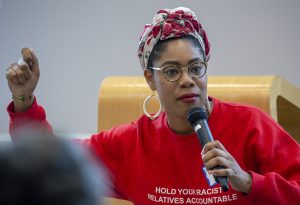In this blog post, I just wanted to express my thoughts and revelations from listening to, reading, and analyzing Kendrick Lamar’s music. For anyone who doesn’t listen to hip-hop/rap, Kendrick is a Compton, CA-born famous rapper who is known for his incredible lyricism, flow, well produced tracks and powerful messages. Listening to his music is not an easy task, packed full of complex word play and metaphors, so I usually have to look up his lyrics and interpret (with Internet help usually) their meaning.
Anyways, what I wanted to express is the amount of current black issues and black history I have learned from listening to his music (in combination with the History of Black America class) But even before the class, I was able to learn about a perspective completely different from mine, with being able to hear emotional and articulate expressions that had me reflect on issues regarding America and blacks. You could say that I became more socially aware through the help of Kendrick Lamar’s music, and along with the help of this class. I wish I could do some in depth discussion of his songs, but I believe it would be too long a post.
In conclusion, I just think it is cool how powerfully music can influence social, political, economic and cultural views and thoughts in respect to black history and issues, and am curious if anyone has had a similar experience with a black artist?
Note: I am not saying other rappers/artists don’t express similar ideas as Kendrick, he is just one in particular who has influenced me more than others (due to his sound, flow, etc.)
Here is an article link analyzing one of his albums for those curious about his music.

